- Home
- MariaLisa deMora
Gunny (Rebel Wayfarers MC Book 5)
Gunny (Rebel Wayfarers MC Book 5) Read online
Gunny
Rebel Wayfarers MC
Book #5
MariaLisa deMora
Edited by Hot Tree Editing
Cover design: Melissa Gill @ MGBookcovers and Designs
Front image: Sara Eirew Photographer & Designer
Back image: Mandy Hollis Photography
Copyright © 2015 MariaLisa deMora
All rights reserved. This book or any portion thereof may not be reproduced or used in any manner whatsoever without the express written permission of the publisher except for the use of brief quotations in a book review. This is a work of fiction. Names, characters, places and incidents are either the product of the author's imagination, or are used in a fictitious manner. Any resemblance to actual persons, living or dead, or actual events is entirely coincidental.
First Printing 2015
ISBN 13: 978-0-98635262-1-6
DEDICATION
These towering walls you have built to protect your heart do nothing more than imprison your spirit. – Dean Jackson
For the wounded among us, no matter the cause, may you find solace and refuge, and live your life in peace.
Contents
1 - FUBAR
2 - Brotherhood
3 - Appearances aren’t reality
4 - Working the bikes
5 - No girls, no way
6 - Moving forward
7 - Duty calls
8 - Ace and Gunny
9 - Sleep, baby
10 - Under my skin
11 - Putting my life in your hands
12 - Rebels ride
13 - My oath to you
14 - Soroicide
15 - Utah
16 - Visitors
17 - New roles
18 - Never leaving you
19 - Knotted ends
20 - Feels like flying
ACKNOWLEDGMENTS
This book began its life folded into the pages of another. In the midst of the whirlwind that surrounded writing Jase, with dismay I realized another strong voice had made his presence known, taking over whole sections of the book. In many ways he derailed the story I wanted to tell about Jase and DeeDee, because Lane Robinson had a very different agenda.
So, over the 2014 Christmas holidays, that is how Gunny came to be brutally ripped from the manuscript of his birthplace. When I had cut all the scenes that didn’t have a place in Jase, there were nearly fifty-thousand words in a cheekily titled document sitting off to the side called PushyBastard.
I had assured him his own book, and now I had to live up to that promise. Another few weeks and I fell into a comfortable rhythm of rising from bed at 5:30 a.m. to write on Gunny, then heading to work, and going home to labor on Jase in the evenings. Advancing both manuscripts in parallel was challenging, but some aspects of their stories were so intertwined the words flowed easily.
Then…one day, I suddenly recognized Gunny the character. I realized who had inspired my mind to imagine this damaged soul. And once I knew who he was, I understood there was so much more of his story to tell than just about his relationship with Jase’s sister, or his part in the Rebel family. So much more, because his tale is one of loss and pain, tempered by redemption and love.
Who is he? He’s a combination of people, the genesis of which can be found in a chance meeting, deep in the woods in southern Indiana. In the spring of 2014 I hiked Knobstone Trail. While on trail I met a hiker, a young man who called himself Jackrabbit Joe.
Joe was an Army veteran dealing with severe Post Traumatic Stress Disorder (PTSD). You’ll likely recognize that first meeting in a scene in this book, and I sincerely hope, since told from Gunny/Joe’s viewpoint, it does not convey the alarm felt on waking in the early morning to find my campsite had been invaded during the night by a man who seemed damaged in ways that seemed both dangerous and frightening. I would never want Gunny to feel how terrified he made Peepers with his outbursts and angry language over trail conditions and other random things, or how alarmed she was by his very presence.
Over the next few days, I was blessed to get to know Joe. And fortunately for me, over those hours and days, the comfortable familiarity we developed stripped the veneer of fear from my interactions with him. Even now, more than a year later, I retain an ashamed memory of those first minutes, and a belated recognition of how differences can make people frightening. Men like Joe and Gunny need understanding and acceptance, not made to feel ostracized even more than their disorder already makes them.
As the writing of this story progressed, as I typically do, I sought out experts on a variety of things. Through my connections, I found a veteran closer to home who was willing to talk to me. Sharing the challenges of living every day staring at the world through the patina of stresses and scenes left behind in his mind by war.
Mikael, an Army vet, suffers from PTSD. For him it has stolen much of the life he led before being deployed overseas. His job—no longer suitable. His family—fearful of his outbursts, have removed themselves from the equation for now. His friends—staunch and supportive, protect him in ways he doesn’t even recognize, such as chaperoning his interactions with me to ensure everything went smoothly. Mikael reassured me that he feels his service had meaning, and he will never regret his decision to enlist and serve. He is hopeful things will all work out in the end, and I believe right alongside him that they will. I am humbled in his presence.
Many other people were essential in ensuring this book made it to this stage, where you, the reader, can hold it in your hand or read it on your tablet. And, by the way, I don’t want to forget to say thank you for reading, for wanting, for loving these characters as I do. Without you, none of this would be possible. <3 Muuwah! In no particular order, here are the ‘thank yous’ for my peeps:
My ever-lovin’ critique partners: Kristen, Hollie, LeeAnn, Kay, Brittney, and the intrepid MirandaPanda. Your honest opinions will forever be treasured. Thank you.
Sara Eirew, your photography is amazing, and I am blessed that you had this shot embodying passionate possession in your portfolio for this oh-so unexpected book. The model, and your art, are remarkable, and the cover by Melissa Gill builds on the intensity captured by your lens. Mandy Hollis, your images are no less stunning, and the dancer picture on the back cover conveys all that is Sharon in ways that mean words are unneeded. Thank you.
Kayla, Becky, and the HTE betas, I am so grateful for your hard work. As always, you make these stories, and my life, better. Thanks!
I can’t forget to thank my personal motorcycle men, members of clubs across many states including Michigan, Indiana, Ohio, Texas, and New Mexico. Love the feedback, and I love you all so freakin’ hard. And, Dino? I hope this book is filled with everything you’ve been asking for, babe. Pucker up!
I do hope this story respects the dedication and sacrifice of the veterans and others I met during this journey, and if it brings to light even an iota of the struggle PTSD brings to their lives, then all their work with me to ensure I got it right is worth it. I’m honored to have met these men, and thank them for their assistance, and in so many cases, for their service.
~ML
1 - FUBAR
Hiding in the back of the truck, he wiped across his face with his sleeve, dragging the cloth slowly and carefully, only moving a bare fraction of an inch at a time. The fabric wasn’t clean, but at least it cleared the stinging sweat and fresh flow of blood from his eyes. One of the wounds near his ear had opened again and was persistently weeping blood. With the truck bed covered as it was by a tarp, he knew it was unlikely anyone could have seen his movement, but he believed in playing it safe…always. That was how you lived through the things he had been through
over the past weeks, and was one of the primary reasons he was still breathing, when many of the jarheads who sauntered onto the base from stateside, clean duffle in hand, weren’t. Slow and steady, he thought, just as Kincade taught you. Men’s voices were approaching the vehicle from the side, and he tensed, listening to their chatter and conversation growing louder, if still unintelligible.
The truck’s suspension rocked as the springs on the driver’s side sank down slightly, accepting the weight of the person climbing behind the wheel. A creak of the hinges just before the slamming door signaled what he hoped was the impending departure of the vehicle from the roadside. Spreading his legs wider on the floor of the truck bed, he braced himself against the motion of the ride to come. He had chosen this vehicle with care, paying close attention to the color of the dirt dusting the sides, knowing from the shade of ochre it had come up from the south, near the area to which he needed to return. After sitting in the bed of the truck for several hours, waiting, holding himself still and immobile, the damaged muscles in his back and chest screamed in pain as the vehicle jostled into motion. He gritted his teeth, telling himself he merely had to endure the ride and it would bring him that much closer to home.
The monotony of the blind ride, the edges of the tarp fluttering in the wind only enough to let in flashes of sunlight, allowed him to sink deep, mining his thoughts and memories. Not for the first time, he racked his brain, trying to decipher exactly what had gone wrong with this mission. The failure behind the reason he was in this truck right now.
They had planned and executed the insertion flawlessly, conducted the surveillance demanded by brass, gained the necessary Intel, and then began their trek to the extract zone. Few people had known about the mission, fewer still had known the details, and only the men with boots on the ground, just the team, had known everything, and much of that only after they were en route. All checkpoint transmissions had gotten through and obtained a normal response from base. Right up to the end, everything looked to be on target; all signals were five-by-five.
They were not thirty minutes from scheduled exfil when disaster struck, unfriendlies overrunning the LZ as they made their undefended approach. He saw his team of men downed by enemy fire, one after the other. All of them, down. Kincade, his longtime friend and mentor, fell without a sound, obscene craters of red splintered into his flesh. Keffiyeh askew, the fabric obscuring Kincade’s face as he crumpled to the ground, and he watched in disbelief as giant blooms of blood on his torso marked where the bullets had found their mark on his friend.
When the bullets finally found him, each had held the weight and punch of a sledgehammer, knocking him from his feet to his knees, and then taking him down, sprawled on his belly. Sucking hard gasps of air, it was from that position he took in the surreal sight of blood from his wounds soaking into the thirsty sand, the splatter rapidly darkening to black as the desert accepted the offering.
From where he lay, he saw Eklund, their communications specialist, frantically trying to contact base, and he watched in horror as the SAT phone Eklund was holding disintegrated in his hand. Then their radioman had slumped backwards from where he crouched, blood pouring from a yawning wound in his neck. He watched as the man’s mouth opened and closed like a fish freshly yanked from the safety of the water to the alien surface of a dangerous and airless dock. At the time, as well as now, nothing about the attack made sense. How would the enemy have known how to find them, when to strike? Where was the leak? Who was the leak?
These men had been his friends…his brothers. His DRP had been detailed to Al Anbar province, sent past the DMZ time and time again, doing deep recon and bringing back much needed information and details about population and group movements, weapons caches and supply routes. Now, he thought bleakly, they were all gone. After the initial attack, he and the lieutenant had made it to a hollowed out area in a hillside, seeking shelter behind a boulder, both men wounded and exhausted, exposed to the unrelenting heat of the sun. Then, three short hours later, he had been alone, the last surviving member of his team.
That was nearly three weeks ago. He stole loose-fitting pants and a long, cloth coat to cover his bloody and torn uniform, and progressively made his way south ever since, most frequently opting to travel at night. He used his keffiyeh to conceal his too-pale features, but nothing could hide his size, so out of place in this land of sand. His only weapon was his military-issue knife, because everything else had been lost in the firefight and flight from the killing field.
Now, as the evening wore on, the steady, never-ending motion of the truck relaxed him, lulling him into a sense of security. As long as they were on the move, he judged he was safe. Safe, he thought, snorting soundlessly. I won’t be safe until I’m back at Chesty. That’s if I can even find the fucking camp. Maybe I’m already dead and this is my Hell, wandering forever, lost and surrounded by enemies.
He sensed rather than heard when the truck first slowed, the vibration from the engine and transmission slacking slightly just before the wheels steered the vehicle to the right, where it bumped off the road. There was the unmistakable sound of people from ahead, likely a farm and homestead, and carefully he worked his way towards the tailgate. He was still attempting to read the sounds and anticipate how much farther the truck had to go, trying to prepare to slide out from under the tarp and over the gate to drop away when the truck abruptly stopped, rocking him in place and halting his progress, effectively trapping him. Fuck.
The truck door latch made rough metallic sounds as it worked, the hinges creaking loudly as they moved, and then, to his horror, came the sound of children’s voices racing towards them from the side. Fuck, I left it too late, he thought, watching as a man’s dark brown fingers wrapped over the top of the tailgate, assuming the other worked the handle. Head first, take the plunge, he thought and moved as the gate dropped. He rolled out from under the tarp, off the surface of the truck, and onto the ground with a pained grunt, a puff of dust visible in the air from his hands and knees landing.
Pushing himself upright, from his full height, he looked down into the shocked eyes of the man he assumed had driven the truck, seeing three children freeze in place only a few feet away. He hunched over, trying to make himself seem less threatening, but with his size and bulk, knew it was an impossibility. Drawing on the few phrases he knew in Arabic, mixing English in his haste to communicate, he held his palms up to show he was unarmed and told the man, “Peace. Salaam a eleikum. Peace. La bas. No harm. No harm. Ar juuk. Please.” The man nodded and made a quick motion with one hand, silently sending the children back towards whatever building they had come from, but neither of the two men looked to watch them go, instead each maintaining focus on the other.
“No harm. Ma’a salaama. In peace, go in peace. Laa a rif ar juuk. I don’t know where I am, please. La bas. No harm,” he repeated, and the man nodded again, rattling off a sentence, which likely held critical information, but he would never know. Languages had been Eklund’s specialty, not his; he and the rest of the team knew only the most rudimentary, mandated phrases. “Chesty,” he said in English, hoping the man knew of the forward camp, and was pleased to see a flash of a smile, white in the dark face, followed by a nod. Another sentence of Arabic came in response, but this time the man held his arm out, pointing towards a glow in the near distance.
“Chesty,” the man said, and moved his arm, pointing again.
No way was he so close. He knew, based on experience, his current run of bad luck wouldn’t support it, so he skeptically repeated himself, seeking confirmation “Chesty? Camp Chesty?”
The man widened his eyes and nodded exaggeratedly, making rapid motions towards the glow against the sky and saying again, “Camp Chesty. Yes.”
Shaking his head in disbelief, he said, “Fuck me. Okay.” He took a breath, wincing at the pain accompanying his movements. “Thanks.” He slowly walked away, because even this close to rescue—close enough to see the lights of the camp—he was really t
oo tired to care. So he unconcernedly turned his back on the man, not even wincing at the thought of taking another bullet. At this point, he thought, who fucking cares, right, Kincade? I think we’re both already dead anyway. There was a burst of Arabic from behind him as the man caught up, long strides easy over the unsteady surface of the sand, speaking quickly. He shook his head in response, barely catching his balance as he staggered sideways in exhaustion, trying to focus on the man’s face. “I don’t understand. I just need to get to Chesty.”
Nodding, the man again said, “Chesty,” this time pointing at himself, and motioning back to the truck. “Camp Chesty,” he said, and gestured to the vehicle.
“You want to drive me? You’re going to drive me to Chesty?” He made steering motions with his hands when he asked the skeptical questions, knowing his southern-laced English wasn’t going to help him communicate.
The man nodded and smiled broadly, hand motions urging him back to the truck. When they were stopped at a challenge point twenty minutes later, he quickly exited, shouting his name and team information, painfully dropping to his knees, hands raised defenselessly. He submitted to the initial questions as patiently as he could, waiting while the men unwound his concealing clothing. When they realized he was American, the soldiers quickly surrounded him, urging him up. After making certain they would be letting the man with the truck go, he allowed them to help him to their vehicle, stoically suffering the pain from bouncing through the rutted and cratered roads. Oorah, he thought. The distinctive and oddly comforting sound of tracked vehicles filled the air as they drove around and through the camp, and he smiled when he realized the only other sounds he heard were English words. They might be spoken in a thick Australian accent, but they were English questions hammering at him. Against all odds, he made it back.

 An Embarrassment of Monsters: A Dark Romantic Suspense Novel (Alace Sweets Book 3)
An Embarrassment of Monsters: A Dark Romantic Suspense Novel (Alace Sweets Book 3) Seeking Worthy Pursuits: A Dark Romantic Suspense Novel (Alace Sweets Book 2)
Seeking Worthy Pursuits: A Dark Romantic Suspense Novel (Alace Sweets Book 2) The Gray Zone
The Gray Zone Mad Minute
Mad Minute Bet on Us
Bet on Us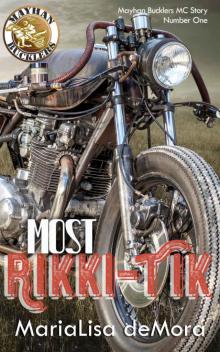 Most Rikki-Tik
Most Rikki-Tik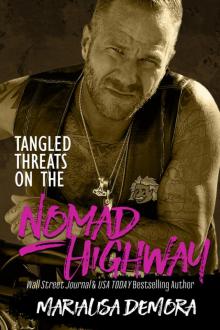 Tangled Threats on the Nomad Highway
Tangled Threats on the Nomad Highway Tarnished Lies and Dead Ends
Tarnished Lies and Dead Ends Neither This Nor That Box Set 1
Neither This Nor That Box Set 1 See You in Valhalla
See You in Valhalla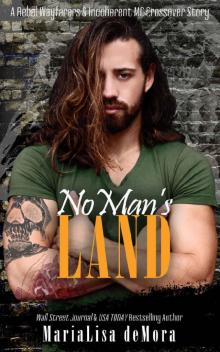 No Man's Land: A Rebel Wayfarers MC & Incoherent MC Crossover Novel
No Man's Land: A Rebel Wayfarers MC & Incoherent MC Crossover Novel Service and Sacrifice
Service and Sacrifice Rebel Wayfarers MC Boxset 3
Rebel Wayfarers MC Boxset 3 Rebel Wayfarers MC Boxset 4
Rebel Wayfarers MC Boxset 4 In Search of Solace (Rebel Wayfarers MC)
In Search of Solace (Rebel Wayfarers MC) Thunderstruck
Thunderstruck Gunny's Pups: #10.25 (Rebel Wayfarers MC)
Gunny's Pups: #10.25 (Rebel Wayfarers MC) Christmas Doings
Christmas Doings Gypsy's Lady
Gypsy's Lady Rules Are Rules
Rules Are Rules Not Even A Mouse
Not Even A Mouse Secret Santa
Secret Santa Duck (Rebel Wayfarers MC Book 8)
Duck (Rebel Wayfarers MC Book 8) Pucker Factor
Pucker Factor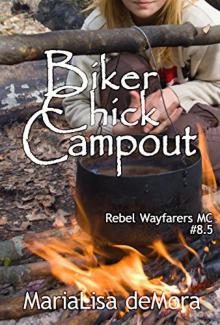 Biker Chick Campout (Rebel Wayfarers MC)
Biker Chick Campout (Rebel Wayfarers MC) Hard Focus
Hard Focus Slate (Rebel Wayfarers MC)
Slate (Rebel Wayfarers MC) Jase
Jase There Are Limits
There Are Limits Going Down Easy: A Rebel Wayfarers MC & Incoherent MC Crossover Novel
Going Down Easy: A Rebel Wayfarers MC & Incoherent MC Crossover Novel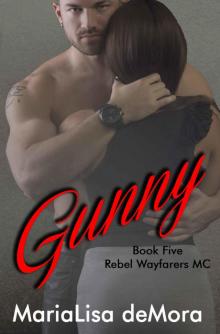 Gunny (Rebel Wayfarers MC Book 5)
Gunny (Rebel Wayfarers MC Book 5) Biker Chicks: Volume 2
Biker Chicks: Volume 2 A Sweet & Merry Christmas
A Sweet & Merry Christmas Bones (Rebel Wayfarers MC Book 10)
Bones (Rebel Wayfarers MC Book 10) Born Into Trouble (Occupy Yourself Book 1)
Born Into Trouble (Occupy Yourself Book 1) With My Whole Heart
With My Whole Heart Harddrive Holidays
Harddrive Holidays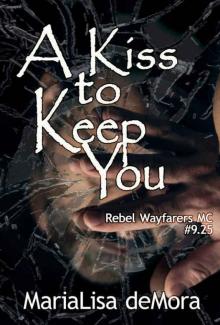 A Kiss to Keep You (Rebel Wayfarers MC Book 14)
A Kiss to Keep You (Rebel Wayfarers MC Book 14)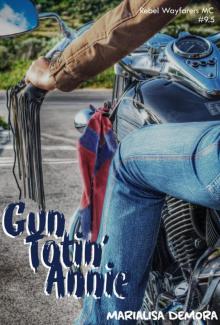 Gun Totin' Annie
Gun Totin' Annie Hoss (Rebel Wayfarers MC Book 7)
Hoss (Rebel Wayfarers MC Book 7) Mica (Rebel Wayfarers MC)
Mica (Rebel Wayfarers MC)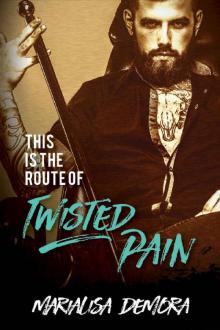 This Is The Route Of Twisted Pain (Neither This, Nor That Book 1)
This Is The Route Of Twisted Pain (Neither This, Nor That Book 1) Fury (Rebel Wayfarers MC Book 11)
Fury (Rebel Wayfarers MC Book 11) Watcher
Watcher